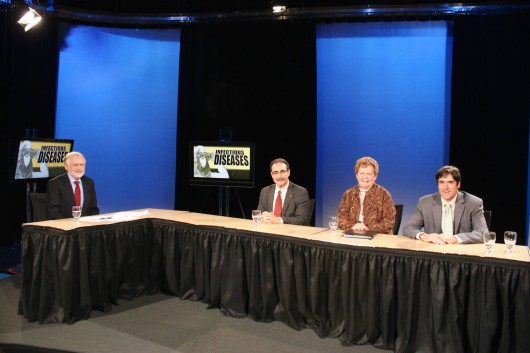
Fred Andrle (left), Dr. Larry S. Schlesinger, Dr. Vicki Friemuth and Richard Harris sit on a panel at a public discussion about infectious diseases Oct. 16 at the WOSU@COSI studios.
Credit: Yann Schreiber / Lantern reporter
Health experts met with the members of the Central Ohio community Thursday when they tried to ease fears of the Ebola virus spreading within Ohio but also criticized national efforts dealing with the virus.
“We don’t have an outbreak (of Ebola) in the United States,” said Dr. Larry S. Schlesinger, chair of the department of microbial infection and immunity at the Ohio State College of Medicine, during a panel discussion at the WOSU studios at COSI.
Dr. Vicki Friemuth, director of the Southern Center for Communication, Health & Poverty at the University of Georgia and a former head of communication at the Centers for Disease Control and Prevention, added that Ebola is not a highly contagious disease for an average person.
Friemuth did say, however, that the CDC should acknowledge that its officials made a mistake when letting a nurse — who later tested positive for Ebola — get on a commercial plane when she reported a fever.
That 29-year-old nurse — Amber Joy Vinson — flew from Cleveland to Dallas on Monday, and tested positive for Ebola on Tuesday. She had treated Ebola patient Thomas Eric Duncan in Dallas at the Texas Health Presbyterian Hospital prior to her travels. Duncan died Oct. 8.
Generally, though, Friemuth said she gave a “very high grade (to the CDC) for communicating with the public continuously,” but that over-reassurance might raise suspiciousness. “Trust is very important in those situations,” she said.
Meanwhile, Richard Harris, science desk correspondent at National Public Radio, said previous experiences have shown that Ebola is “quite handleable,” but that no one had had “a chance to practice” response protocols.
“Médecins Sans Frontières (a nonprofit humanitarian organization) has figured out how to do it,” he said.
He said the chances of the virus mutating to become a bigger threat — given that viruses can do anything — is highly unlikely.
He also said that a virus generally tends to mutate in the opposite direction, becoming less infectious.
The virus, which has already killed 4,493 people worldwide, according to the CDC’s website, first appeared in the U.S. when Duncan had come to the country from Liberia on Sept. 20.
Schlesinger said a specific plan for Ebola was never set up in the U.S. prior to the virus reaching the country.
He said the OSU Wexner Medical Center had put up a “concerted effort,” adding the hospital has dealt with “a lot of complicated infections in the past.”
Still, at least one OSU health expert said she thought the virus wouldn’t end up reaching Ohio when asked by The Lantern earlier this month.
Dr. Christina Liscynesky, an assistant professor in the Medical Center Department of Internal Medicine’s division of infectious diseases, said the chances of the virus spreading to Ohio were “very, very low,” in an Oct. 2 article from The Lantern.
Various university spokespeople have also said OSU has been monitoring the outbreak.
“The university, including experts at the Wexner Medical Center, is continuing efforts that began in August to prepare for the possibility of a suspect or confirmed EVD case within the university or within the Central Ohio community,” OSU spokeswoman Liz Cook said in an Oct. 15 email.
Harris said media have not overplayed the Ebola outbreak in Africa, though “domestically it varies a lot.”
“It isn’t a health story anymore, it became political,” he said, adding that “details go over people’s head” even when given a calm message.
Countries affected by the virus so far are: Guinea, Liberia, Nigeria, Senegal, Sierra Leone, Spain and the U.S.
Schlesinger said there was poor care available on the ground in the affected countries, and that, unlike in central Africa where previous Ebola outbreaks had happened, those West-African countries had suffered recent civil wars, which affected health care.
“It is clear that infections cross borders,” Schlesinger said, and added later, as he was “confident that we will be controlling Ebola in the U.S.,” attention has to shift to what will happen later. “I hope we will learn,” he said.
The panel was part of a series of discussions around topical health issues, public health and health communication issues, organized by the OSU School of Communication and Nationwide Children’s Hospital, in association with WOSU. “We want to provide a moderate discussion, and connect the public to health, communications and policy experts,” said Erik Nisbet, an associate professor at the School of Communication.
After a moderated discussion, there was the opportunity for the public to ask questions. The discussion was recorded and is to be broadcast on WOSU. There was no broadcast date available at the end of the recording, though Nisbet said it will be “in a couple of weeks.”
The next panel is set to take place on Nov. 13 at 7 p.m., with seating starting at 6:30, and focus on infant mortality.


